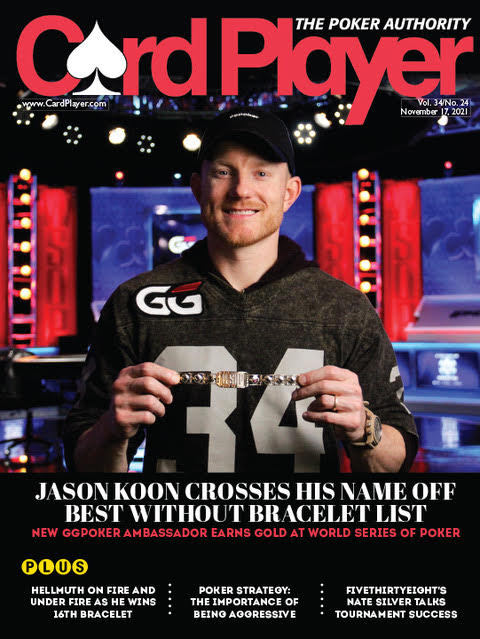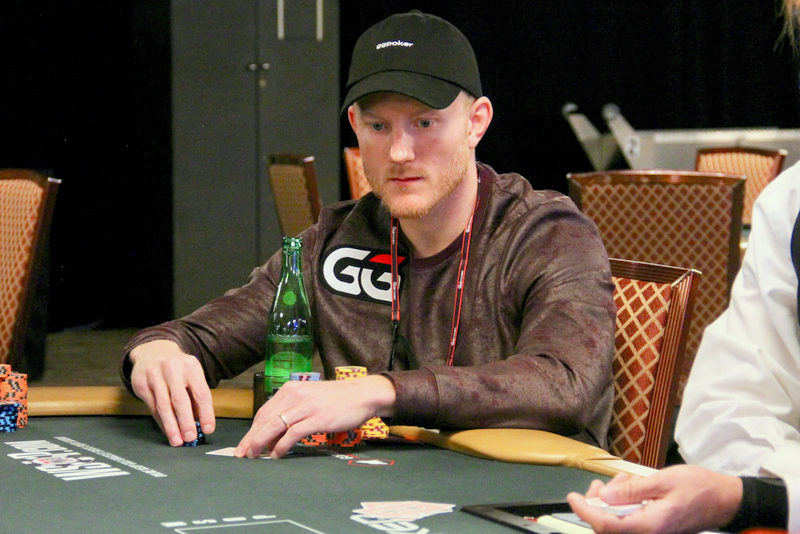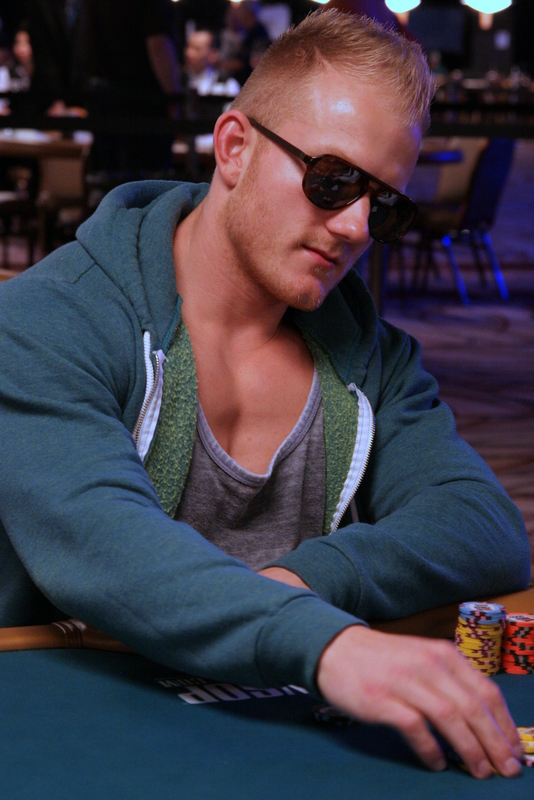






Jason Koon Crosses His Name Off ‘Best Without A Bracelet’ ListNew GGPoker Ambassador Earns Gold At WSOPby Julio Rodriguez | Published: Nov 17, 2021 |
|
|
 Sitting no. 9 on poker’s all-time money list with nearly $34 million in career tournament earnings, it was hard to believe that Jason Koon still had a major hole in his poker résumé. The West Virginia native had found the winner’s circle 24 times during his live tournament career, but never claimed gold at the World Series of Poker.
Sitting no. 9 on poker’s all-time money list with nearly $34 million in career tournament earnings, it was hard to believe that Jason Koon still had a major hole in his poker résumé. The West Virginia native had found the winner’s circle 24 times during his live tournament career, but never claimed gold at the World Series of Poker.
Winning a bracelet was a foregone conclusion for the online star turned high-stakes monster even back when he recorded his first series cash in 2009. A runner-up finish in the $3,000 NLH/PLO event in 2012 to Leif Force stung, but Koon assumed there would be plenty of future opportunities to get his bracelet.
There was a fourth-place finish the next year, then a seventh, three straight ninths, and a fifth, but he got no closer and furthermore, his schedule almost exclusively consisted of high roller tournaments and high-stakes cash games, giving him less opportunities to scratch his name off the ‘Best Without A Bracelet’ list.
Then this fall, just weeks after the birth of his son, Koon navigated his way through a field of 57 entries in the $25,000 Heads-Up Championship to earn $243,981, and more importantly, get the monkey off his back. Along the way, Koon defeated Chris Brewer, Nicolai Morris, Johannes Becker, Jake Daniels, Henri Puustinen, and Gabor Szabo.
The victory capped off a whirlwind week for the former Wesleyan College track star. On the same day that he was introduced as GGPoker’s newest global ambassador, Koon managed to make simultaneous deep runs in a pair of high-stakes series events. Not only did he finish ninth in the $25,000 high roller event, but he did so while also taking sixth in a $5,000 online event he was playing on his phone.
Card Player caught up with Koon after his victory to discuss where the bracelet ranks among his accomplishments, his new online poker sponsorship, and what’s left on his poker bucket list.
Card Player: Can you talk about your thoughts on the WSOP, both now and when you were first starting in poker.
Jason Koon: The WSOP was really the first time I had ever been exposed to poker, before I knew the rules or anything. I saw it on ESPN and [Chris] Moneymaker won the main the year I graduated high school. The thought of winning a bracelet was kind of my most important goal for the first few years of my career.
If you look [at my cashes], I grinded the WSOP religiously. In 2012, I got second in an event, and I remember being so upset about it. I had an unrealistic expectation that I was going to win. The truth is that it was a half PLO tournament, and I barely knew the rules at the time and was playing against a good player and easily a favorite against me.
From there, I started playing bigger and bigger games, and I realized that I needed to change my approach. I needed to approach it as a professional and not necessarily worry about the glory as much as I needed to worry about making money and making ends meet. I like the freedom poker provides for me, I don’t want to have to go do another job. I was still excited for the glory of winning tournaments, but I also had to be focused on my bottom line.

I started climbing up in stakes, and by the time I was playing in the biggest games around, it just didn’t make a lot of financial sense for me to show up to the Rio most days. If I was playing a non-high roller WSOP event, I was doing it strictly for fun. Luckily, I’m now at a point in my life when I can choose to do a lot more things just for fun.
CP: Can you talk about the pressure placed on you by poker media? I imagine the first time you see yourself on a ‘Best Without A Bracelet’ list, it’s flattering. But after the fourth or fifth year, I’m sure it can get a little old to hear about.
JK: There’s a lot of storylines that get kind of implanted in your brain. I remember one year I was walking in to play the $1 million buy-in One Drop tournament. It was a summer where I had been playing a ton of short deck cash at other casinos and had only played maybe one or two high rollers at the series. One media person stopped me on the way in and asked for a quick interview.
One of the first things he said was, ‘Well, we can see here that you’re having a really bad WSOP with no cashes….’ That’s when I realized that the outside world can only see what they see, you know?
A perfect example of that is this $25,000 heads-up event that I won. It was an amazing tournament, a ton of fun to play, but I won $243,000. Don’t get me wrong, that’s a great result. But I’ve probably played 5,000 cash game hands where the pot has been bigger.
 Nobody sees that. I’d have these epic battles, playing for weeks on end for giant stakes where I haven’t slept and have no adrenaline left. Exhausted, and swinging for figures that sound like they’re out of a movie. Not a single person would ever know to call or text me congratulations for the big win. But I win a WSOP event, and the next day I have 800 messages on my phone.
Nobody sees that. I’d have these epic battles, playing for weeks on end for giant stakes where I haven’t slept and have no adrenaline left. Exhausted, and swinging for figures that sound like they’re out of a movie. Not a single person would ever know to call or text me congratulations for the big win. But I win a WSOP event, and the next day I have 800 messages on my phone.
There’s clearly an ego element to all of us, and I’d be lying if I said it wasn’t a nice ego boost to have the public’s validation. Like, ‘Oh, he finally won one? Good for him.’
And the bracelet is by far poker’s greatest trophy. It should be an honor for people to win one of these things. I had said something awhile back about all the different events nowadays, and I didn’t mean to tarnish what bracelets should be to the poker world. At the end of the day, coming here for adult summer camp and seeing your friends that you’ve known forever and competing with people who take time off every year to come to Vegas and see their heroes walk the hallway… There really is nothing like it. There’s an energy in the Rio, even as an older casino with the same seats that Amarillo Slim sat in.
CP: After the final hand of the tournament, you were shown on the PokerGO broadcast literally flinging an imaginary monkey off your back.
JK: It was emotional. My father-in-law was there, and I wanted to win for him. My brother, who is an avid poker fan and has always supported me… I always told him that he could have my first bracelet. I said, ‘The first time I win one of these, and I’m going to win a bunch (laughing), I’ll give it you.’
So, yeah, it was frustrating that I couldn’t make that happen for him. In a lot of ways, that monkey off my back was more like, ‘Okay Mike, you finally get your damn bracelet that I’ve been promising for a decade.’
CP: You mentioned the money you won, which was $243,981. Any idea where that ranks monetarily on your all-time cash list?
JK: Oh man, I don’t know. I’ve played a lot of tournaments. Maybe 50th?
CP: That’s pretty close, it’s 42nd. Where does it rank for you in terms of personal accomplishments?
JK: There’s so much luck involved in winning any one tournament. Honestly, it’s just a numbers game. I know that seems dull, but it’s the truth. If you’re a good poker player, you’re going to win eventually.
 Now that being said, this was a format that was special to win. I’m by no means ultra sharp at heads-up no-limit and there were several players in this tournament that were just better than I was at the format. I had to play at least one, if not two that were better than me. The guy that I drew in the semifinals, [Henri Puustinen], is one of the very best on the planet.
Now that being said, this was a format that was special to win. I’m by no means ultra sharp at heads-up no-limit and there were several players in this tournament that were just better than I was at the format. I had to play at least one, if not two that were better than me. The guy that I drew in the semifinals, [Henri Puustinen], is one of the very best on the planet.
In every single match, I had to win in a spot where I was anywhere between 35 to 60 percent, and I won a bunch of those in a row to get there. So, in terms of a poker accomplishment, there’s nothing really impressive about it. The cards were on my side. But in terms of a poker experience? It’s right up there and something that I’ll never forget, being in the Thunderdome with all of the madness and friends on the rail. A lot of people really wanted me to win that thing, and that was a special feeling seeing so many rooting for me.
CP: Do you have anything left on your poker bucket list?
JK: I want to get really good at PLO, especially as short deck action dies down. I eventually want to get to the point where I’m confident at every game you can throw at me, even if I’m not elite. I’d like to be confident enough to just donk around in the $50K Players Championship every year, be able to go into Bobby’s Room and play the mixed games sometimes. I love thinking about new games in a theoretical sense and kind of breaking them down, and I think that that fits the way my brain works. I think I will be very good at all the games if I apply myself.
But also, I just want to continue to enjoy the game. I haven’t gotten to really enjoy the game in recent years, to be honest. I’ve played millions and millions of hands, but most of those were during crunch time. Some of the stakes that I was playing in the last 10 years, were make or break situations. I guess I could have always rebuilt, but there were situations that were really, really stressful, swinging for massive amounts.
I’m looking forward to being almost a recreational player, just enjoying the competition. When you’re in that rat race, you don’t get to do that. You look back and say, ‘Whoa, that happened?’ And generally, if you’re a good poker player, what happened is good in terms of dollars, but life blurs by. That’s the sacrifice that you make. You don’t get to appreciate how wonderful things are.
CP: Speaking of wonderful, you and your wife Bianca just welcomed your first child last month. Stephen Chidwick also won his first bracelet after having his first child back in 2019. Do you believe in baby run good?
JK: I’m not going to deny the baby run good, but I’ve run so good in my last five years anyway. I’ve had months where I thought things were rigged for me in some way. I believe I might be in a simulation, and somebody flipped on the run good switch for me, and I’m just taking it in every day. And lately I have this feeling in poker, which is great, that worst case scenario, I get to go home and hang out with my son. It’s pretty awesome.
CP: Let’s talk about your recent online poker sponsorship with GGPoker. I think it’s clear to most why they would want to be associated with you, as someone who has always been known for having integrity and is willing to call out shady activity in the poker world.
JK: I’m blown away by that. Honestly, when they hit me up, they said that they had been waiting a long time for me to be a free agent and to have a conversation with me. It was flattering. They explained their vision, and I hadn’t fully understood just how calculated their goals were and how concise they were with their direction. Once I saw that, I kind of didn’t have a choice. This is the squad I had to go with.
The truth of it is that GGPoker has dominated the last couple of years. They’ve had the biggest tournaments, and the biggest cash games that the mainstream online poker world has ever seen. I mean, I played $500-$1,000 on Full Tilt, but I played $1,000-$2,000-$4,000 on GG. Just enormous games.

Koon At 2012 WSOP
In addition to playing on the site whenever I’m traveling or spending time in Vancouver, I’m also going to be the eyes and ears of the poker world and try to be a voice for everyone. One of my main goals is to protect players, recreational and pros alike, to help find and stop cheating. Frankly, GG is already way ahead of the game with their detection methods and how much effort they are putting into it, but I’m going to use my expertise to help and make sure the streets are clean.
CP: Some of your biggest scores have come in the Triton Poker Super High Roller series. Are you looking forward to getting back out there?
JK: For sure. There’s going to be some really exciting stuff announced for 2022, and we’re looking to expand to some new locations and host different types of tournaments. Triton Poker is coming back bigger than ever.
CP: Is there a poker player whose career you’d like to emulate?
JK: I think all of those old school legends, just the fact that they’re still doing it is impressive. I’m 13 years into this, and I feel like I’ve been playing poker for 30 years. So you look at a guy like Erik Seidel, who has actually been playing that long and is still competing at a very high level. Phil Hellmuth is a freak of nature. Look at what he’s doing this series. Regardless of how you feel about the dude, he’s obviously special. If I’m even around the game in 20 years and can compete, that would be great.♠
Top Tournament Scores
| Date | Event | Place | Payout |
| May 2018 | HKD$1M Triton Poker Montenegro Short Deck | 1st | $3,653,260 |
| March 2019 | HKD$1M Triton Poker Jeju Short Deck | 1st | $2,899,000 |
| May 2018 | $300,000 Super High Roller Bowl | 3rd | $2,100,000 |
| Jan. 2017 | $100,000 PCA Super High Roller | 1st | $1,650,300 |
| Aug. 2019 | £50,000 Triton Poker London NLHE | 2nd | $1,106,540 |
| Aug. 2018 | HKD$2M Triton Poker Jeju NLHE | 5th | $1,079,042 |
| May 2018 | $100,000 Aria High Roller | 1st | $1,039,940 |
| Aug. 2016 | $5,000 Hard Rock Poker Open | 1st | $1,000,000 |
| March 2019 | HKD$1M Triton Poker Jeju | 1st | $993,211 |
| Dec. 2018 | $100,000 Five Diamond World Poker Classic | 2nd | $888,000 |
| Sept. 2020 | $25,000 WPT Online World Championships | 2nd | $810,869 |
| March 2018 | HKD$2M Super High Roller Bowl China | 9th | $741,875 |
| Nov. 2019 | $250,000 Caribbean Poker Party | 7th | $637,500 |
| April 2018 | €100,000 MILLIONS Grand Final Barcelona | 4th | $620,000 |
| July 2016 | $25,000 Bellagio High Roller | 1st | $514,080 |
Features
Tournaments
Strategy
Commentary & Analysis